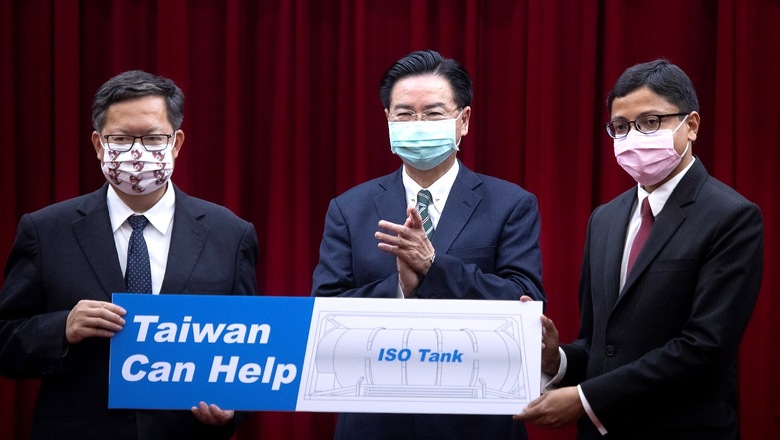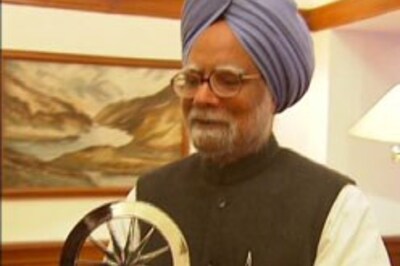
views
The outreach to countries across continents has been one of Prime Minister Narendra Modi’s most significant policy achievements. During his foreign visits, Modi never misses an opportunity to reach out to the Indian community abroad and bond with them over common heritage and shared aspirations as members of one of the richest and oldest civilisations. To that end, several cabinet ministers have also travelled to far flung countries where India hitherto had rather limited presence.
As one of the sought-after destinations of Indians abroad, Taiwan is carving out a niche for itself. Even though Indian migration to Taiwan is limited and relatively recent compared to the Caribbeans and Southeast Asia, it is beginning to make a mark in terms of the contribution the Indian community is making in some critical sectors. However, this remains limited and undervalued due to the scope of the unofficial ties between India and Taiwan.
Taiwan is a home to at least 5,000 Indian citizens and some members of the diasporic community. The Indian community in Taiwan consists of businesspersons, restaurateurs, academicians, engineers, artists, students and think tankers. Most Indians in Taiwan hold white collar jobs and are considered among the highly educated in the expatriate community. Considered a closed-knit affluent society, Indians have made significant strides in Taiwan.
So far as the evolution of Indian community in Taiwan is concerned, Indians moved to Taiwan in five waves. First, in the 1970s, Indians, mainly Gujarati Sindhis and Marwari traders, settled in Taiwan and began exporting ‘made in Taiwan’ products to different parts of the world. It was the time when Taiwan was emerging as a major manufacturing hub, and its economy was registering a boom.
Second wave was in the 1980s, when gem traders from Gujarat entered the precious stones markets and built back-and-forth linkages between the source and the product market via the processing industries often based in Surat.
The launch of MSMEs (Micro, Small and Medium Enterprises) by Indians contributed to the economic transformation of Taiwan. The rising prosperity naturally brought along more stability and consequently led to Indian families finding it viable to settle down in Taiwan.
Next wave of Indians moving to Taiwan was in the 1990s. These Indians were mostly expatriates who were employed in multinational corporations and came to Taiwan only for a shorter duration. During the same time frame, another group of Indians that made Taiwan their home was Chinese-Indians. Chinese-Indians were classified as overseas Chinese and were given a one-time opportunity to seek Taiwanese citizenship. Some of the Chinese-Indians availed the offer and became Taiwanese citizens. The 1990s was also the time when inter-racial marriages between Indians and Taiwanese became normalised.
The nature of Indian residents truly changed in the 2000s when several Indian engineers and techies began to look towards Taiwan for better work opportunities. Most techies and engineers came to Taiwan with their short- to mid-term plans.
Fifth, it was only in the 2010s that Taiwan began to see an influx of academicians, scholars and students – mostly language and doctoral, post-doctoral scholars in the field of sciences. This was primarily a result of the signing of three MoUs: MoU on Science and Technological Cooperation (2007); MoU of Cooperation between ROC (Taiwan) Academia Sinica and Indian Academy of Science (2012); and MoU between Foundation for International Cooperation in Higher Education of Taiwan and Association of Indian Universities (2019). This explains how more than 50 per cent of the Indian community in Taiwan now comprises students pursuing tertiary and professional degrees.
The Indian community played a distinct role not only in becoming a part of Taiwan’s economic boom, but by also contributing to the Indian economy. Taiwan is home to more than 50 Indian restaurants – owned by Indians – that employ a significant number of both Indians and Taiwanese, thereby creating job opportunities for the local people and building a more harmonious linkage.
Established only in 1995, India’s de-facto embassy in Taiwan, ITA’s (India Taipei Association) mandate is to focus primarily on commercial and consular issues. Before the ITA, an Indians-led association, Indians’ Association of Taipei (IAT), was active in helping the Indian community, and even received incoming parliamentarians on several occasions. Several other registered associations representing Indians from different states have come up. Three important yet unnoticed examples include the Taiwan Tamil Sangam, Taiwan Telugu Indians Cultural Sangam and Taiwan Malayali Sangam. While most Taiwanese are only aware of North Indian cuisine and culture, these associations are showcasing the diversity and culinary experience of South Indian states as well. There are a few online groups such as “Indians in Taiwan”, which provide a helpful platform, with a people-centric approach, to Indians living or planning to arrive in Taiwan.
While members of the Indian community are considered cultural ambassadors abroad, this is even truer for the Indian diaspora in Taiwan. Members of the Indian community have been organising Indian festivals and cultural events for decades now. In 2021, during the second wave of the COVID-19 pandemic, several Indians came together and sent oxygen cylinders and concentrators along with other medical equipment to India.
While India-Taiwan relations are dominated by three factors – Commerce, China and Culture – the Indian diaspora in Taiwan is attempting to expand the horizons of Taiwan’s understanding of India. However, most of the time, the contribution of the Indian diaspora in Taiwan is underappreciated by India. While the Indian diaspora scenario is dominated by Indian-Americans, or diaspora based in Canada and the United Kingdom, this should not overshadow the excellent contributions made by the Indian community in Taiwan. It is time we recognise the beauty of this smaller wonder called the Indian community in Taiwan.
ALSO READ | Why India Must Engage Taiwan Even If It Ruffles a Few Chinese Feathers
Sana Hashmi is Visiting Fellow at Taiwan-Asia Exchange Foundation. She tweets @sanahashmi1. The views expressed in this article are those of the author and do not represent the stand of this publication.
The author is grateful to Dr Priya Lee Lalwani, first Indian student in Taiwan and a long-term resident, for her insightful interview for this article.
Read all the Latest Opinions here



















Comments
0 comment